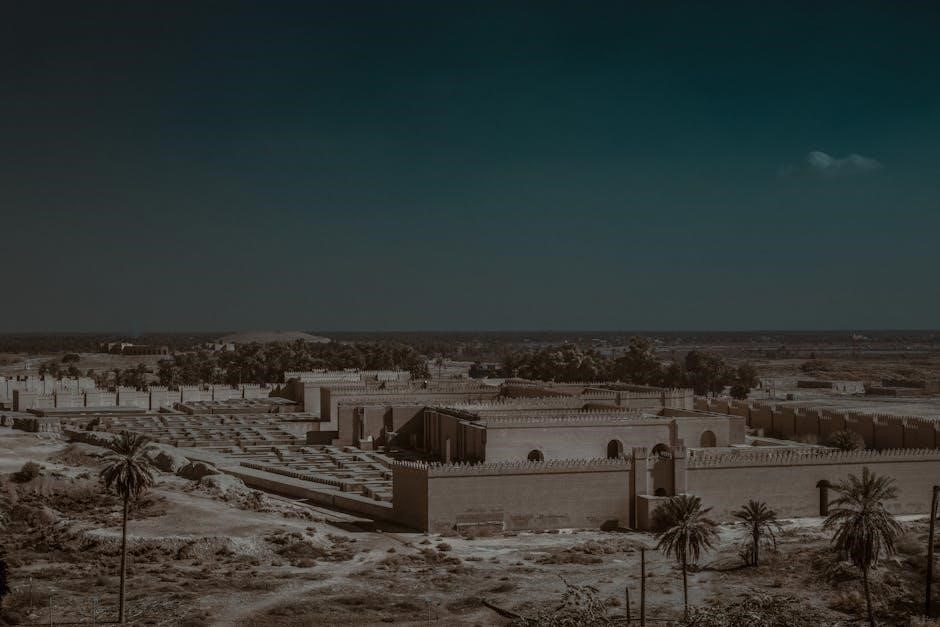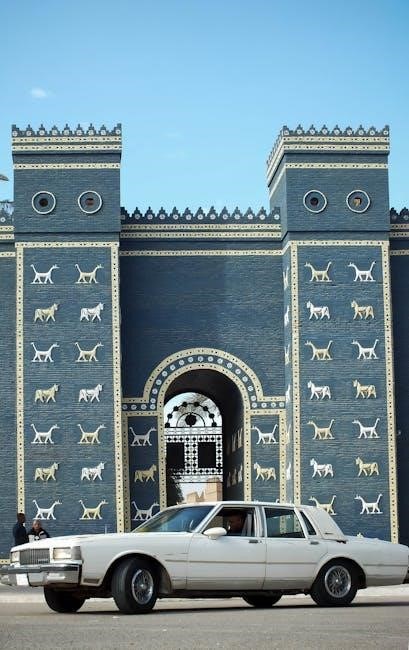
This book explores the historical journey of Black races from ancient Mesopotamia to Africa, highlighting their cultural and civilizational contributions, challenging conventional historical narratives.
Overview of the Book
From Babylon to Timbuktu: A History of the Ancient Black Races Including the Black Hebrews by Rudolph R. Windsor is a meticulously researched work that traces the historical journey of Black civilizations. The book explores the origins and achievements of ancient Black races, shedding light on their contributions to global history and culture. It delves into the history of the Black Hebrews, their presence in regions like Mesopotamia, Egypt, and Ethiopia, and their spread across Africa. Windsor challenges conventional narratives, emphasizing the significance of Black influence on world history. The book is concise yet informative, making it accessible to both general readers and scholars. Its rich detail and historical insights provide a vital resource for understanding the legacy of Black civilizations.
Importance of the Book in Historical Context
From Babylon to Timbuktu holds significant importance as it challenges Eurocentric narratives by highlighting the contributions of Black races to global history. The book provides extensive evidence of advanced Black civilizations in regions like Mesopotamia, Egypt, and Africa, correcting historical omissions. Windsor’s work empowers readers by revealing a more accurate and inclusive account of the past. Its meticulous research and accessible style make it a vital resource for both scholars and the general public, fostering a deeper understanding of Black heritage and its global impact. The book’s historical insights are essential for broadening perspectives and correcting the erasure of Black contributions from traditional historical education.
Ancient Civilizations and the Black Races
Ancient Black races played pivotal roles in shaping early civilizations, with significant influences in Mesopotamia, Egypt, and Africa, leaving enduring legacies in culture, science, and governance.
The Black Hebrews: Origins and History

The Black Hebrews, a fascinating group, trace their origins to ancient Mesopotamia and Africa, with roots tied to biblical figures like Abraham. Their history reflects a complex journey of migration and cultural adaptation, as they moved through regions such as Babylon, Egypt, and Ethiopia. The book highlights their significant role in shaping early civilizations and their influence on religious and cultural practices. Despite historical challenges, the Black Hebrews maintained a distinct identity, leaving a lasting legacy in the regions they inhabited. Their story challenges conventional narratives, offering a fresh perspective on the contributions of Black races to global history and culture.
Abraham and the Black Hebrews in Babylon

Abraham, a central figure in biblical history, is closely linked to the Black Hebrews, with his journey in Babylon marking a pivotal moment in their history. The book explores Abraham’s connection to the Black Hebrews, highlighting their presence in ancient Mesopotamia. It delves into how their cultural and religious practices were influenced by their time in Babylon, shaping their identity and traditions. The text reveals the significance of this period in establishing the Black Hebrews’ role in early civilizations and their enduring legacy. This section offers a unique perspective on Abraham’s story, emphasizing the Black Hebrews’ contributions to the cultural and religious tapestry of the region.
Black Presence in Ancient Mesopotamia
The book highlights the significant presence of Black races in ancient Mesopotamia, a region known for its early civilizations. It explores how Black communities contributed to the cultural, social, and technological advancements of the time. Mesopotamia, often regarded as the “cradle of civilization,” was home to diverse populations, including Black individuals who played roles in governance, trade, and cultural development. The text emphasizes their influence on the region’s history, challenging the often-overlooked narratives of Black participation in these ancient societies. By examining archaeological evidence and historical records, the book sheds light on the integral role of Black people in shaping Mesopotamia’s legacy, revealing a rich and often untold chapter of human history.
Egypt and the Black Races
Egypt’s history is deeply intertwined with the presence and influence of Black races, as explored in “From Babylon to Timbuktu.” The book delves into the cultural and spiritual contributions of Black populations in ancient Egypt, highlighting their role in shaping its civilization. It examines the historical connections between Black races and Egyptian society, challenging conventional narratives that often overlook their significance. By tracing the interactions and exchanges between Black communities and Egyptian cultures, the text provides a more inclusive understanding of Egypt’s past. This section emphasizes the enduring legacy of Black races in Egypt, offering insights into their impact on art, religion, and governance, and underscores their integral role in the region’s historical development and cultural identity.
The Kingdom of Kush and Its Significance
The Kingdom of Kush, located in ancient Sudan, emerges as a pivotal civilization in “From Babylon to Timbuktu.” Known for its wealth and military prowess, Kush flourished along the Nile River, establishing a rich cultural legacy. The book highlights Kush’s architectural marvels, such as its pyramids, and its strategic role in trade and cultural exchange. Kush’s influence extended beyond its borders, shaping the broader African and Mediterranean worlds. Its interactions with Egypt and other neighboring regions underscore its significance in the history of Black civilizations. By examining Kush’s rise, dominance, and eventual decline, the text reveals its enduring impact on African heritage and global history, emphasizing its role as a cornerstone of Black cultural and political achievement.
The Spread of Black Civilizations in Africa

The book traces the migration and cultural diffusion of Black civilizations across Africa, emphasizing their role in shaping ancient empires and trade networks.
Black Civilizations in Axum and Ethiopia
Axum and Ethiopia were pivotal in the spread of Black civilizations, boasting rich cultural and religious heritage. Axum, an ancient kingdom, thrived as a major power in East Africa, known for its monumental obelisks and trade networks. Ethiopia’s history is deeply intertwined with biblical narratives, including the visit of the Queen of Sheba. The region’s connection to the Black Hebrews is explored, highlighting their enduring influence. Ethiopia’s unique script, Ge’ez, and its role as a refuge for Jewish and Islamic traditions underscore its significance. The book details how these civilizations flourished, leaving lasting legacies in architecture, literature, and faith, proving their integral role in African and global history.
Hebrews in Madagascar, Ghana, and Sudan
The presence of Hebrews in regions like Madagascar, Ghana, and Sudan highlights the extensive migration and influence of Black Hebrew communities. Madagascar’s Hebrew traces are less documented but intriguing, suggesting early maritime connections. In Ghana and Sudan, Hebrew traditions blended with local cultures, evident in customs and linguistic ties. Historical records and oral traditions point to their enduring legacy. These regions showcase the dispersal of Hebrews beyond the Middle East, underscoring their role in shaping diverse African societies. The book explores these connections, offering insights into how these communities preserved their identity amidst cultural exchanges and historical challenges.
The Role of Black Races in African Empires
The Black races played a pivotal role in shaping the rise and prosperity of African empires, contributing to their cultural, political, and economic advancements. Empires like Kush, Axum, and Mali were led by Black rulers who established powerful kingdoms, fostering trade and knowledge exchange. Their leadership and innovations in agriculture, architecture, and governance laid the foundation for these empires’ success. The influence of Black races extended beyond Africa, connecting with global trade networks and spreading cultural practices. These empires’ achievements challenge Eurocentric narratives, emphasizing the agency and brilliance of Black civilizations in shaping world history. The book highlights their enduring legacy, showcasing how they thrived despite historical challenges and external pressures.

Religious and Cultural Contributions
The Black races significantly influenced Judaism, Christianity, and Islam, while enriching global culture through art, literature, and traditions.
Black Influence on Judaism and Christianity
The book highlights the profound influence of Black races on the development of Judaism and Christianity. It traces the origins of these religions to Black civilizations, emphasizing the role of the Black Hebrews in shaping early religious thought. The Abrahamic covenant, central to both faiths, is explored in the context of Black heritage. The presence of Black figures in religious narratives, such as the biblical patriarchs, underscores their foundational role. The text also examines how Black cultural practices and spiritual traditions influenced religious doctrines and rituals. By revealing these connections, the book challenges conventional historical narratives, offering a more inclusive understanding of religious origins and evolution.
Islamic Civilization and the Black Races
Rudolph R. Windsor’s book sheds light on the significant contributions of Black races to Islamic civilization. It highlights the role of Black scholars and leaders in shaping Islamic thought and culture. The book explores how Black African empires and kingdoms embraced Islam, fostering a rich cultural and intellectual exchange. Notable figures, such as Bilal ibn Rabah, a Black companion of the Prophet Muhammad, are discussed as examples of Black influence in early Islam. The text also examines the spread of Islamic knowledge through Black African scholars and the establishment of centers like Timbuktu as hubs of Islamic learning. This section challenges stereotypes by showcasing the integral role of Black races in the Islamic Golden Age and beyond.
Ethiopian Jews and Their History
Ethiopian Jews, also known as Beta Israel, have a unique history rooted in ancient traditions. The book explores their origins, tracing back to the biblical era, with some narratives linking them to the Queen of Sheba and King Solomon. Their distinct identity as both Ethiopian and Jewish is a central theme. The text highlights their migration from Babylon and their eventual settlement in Ethiopia, where they maintained their faith despite isolation. The book also delves into their cultural practices, such as adhering to the Torah and their own liturgical customs. Windsor’s work emphasizes their resilience and contributions to the broader narrative of Black civilizations, offering a fascinating glimpse into their enduring legacy.

Timbuktu: A Center of Learning and Culture
Timbuktu was a renowned center of learning, fostering education and cultural exchange. It preserved ancient texts, contributing significantly to global knowledge and intellectual history.
Timbuktu’s Role in Preserving Knowledge
Timbuktu emerged as a vital center for preserving ancient manuscripts and texts, safeguarding knowledge from Africa and beyond. Scholars and scribes meticulously copied and stored works on various subjects, including astronomy, mathematics, and medicine. The city’s famous Sankore University attracted intellectuals, fostering a culture of learning. These manuscripts, often written in Arabic, highlighted the Islamic Golden Age’s contributions. Timbuktu’s preservation efforts ensured that valuable knowledge survived, despite challenges like environmental degradation; This legacy underscores the city’s enduring impact on global intellectual history, making it a cornerstone of African and Islamic scholarship.
Black Scholars and Their Contributions to World Knowledge
Black scholars played a pivotal role in advancing global knowledge, particularly during the Islamic Golden Age. African intellectuals contributed significantly to fields such as mathematics, astronomy, and medicine. Scholars like Al-Battani and Al-Khwarizmi revolutionized scientific thought, while others preserved ancient texts, ensuring the survival of critical knowledge. Their work in Timbuktu and other centers of learning highlighted the richness of African and Islamic scholarship. These contributions not only enriched global intellectual heritage but also laid the foundation for future advancements. Their legacy remains a testament to the enduring impact of Black scholars on world knowledge and culture.

The Islamic Golden Age and Black Contributions
The Islamic Golden Age saw significant contributions from Black scholars in mathematics, astronomy, and medicine, shaping global knowledge and cultural advancements during this period of intellectual flourishing.
Black Inventors, Scholars, and Their Achievements
Black inventors and scholars played pivotal roles during the Islamic Golden Age, contributing significantly to mathematics, astronomy, and medicine. Scholars like Al-Battani and Ibn Yunus made groundbreaking advancements in trigonometry and celestial mechanics. Their work laid the foundation for later European scientific advancements. Black inventors also excelled in engineering and architecture, designing innovative irrigation systems and grand structures. These achievements not only enriched Islamic civilization but also left a lasting legacy in global knowledge. Their contributions underscore the intellectual brilliance and creativity of Black scholars, challenging historical narratives that often overlook their impact. This era highlights the profound influence of Black minds on the development of various scientific and cultural fields.
Cultural Exchange Between Africa and the Middle East
The cultural exchange between Africa and the Middle East was vast and transformative, particularly during the Islamic Golden Age. Trade routes, such as the Trans-Saharan, facilitated the movement of goods, ideas, and people. African scholars and merchants traveled to centers like Baghdad and Damascus, while Middle Eastern influences flowed into Africa; Cities like Timbuktu became hubs where African, Arab, and Islamic cultures intertwined. This exchange enriched both regions, fostering advancements in education, architecture, and religion. African contributions, such as agricultural knowledge and artistic traditions, blended with Middle Eastern innovations, creating a rich tapestry of shared heritage. This exchange underscores the deep historical connections between these two regions.
Modern Relevance and Legacy
The book sheds light on the erasure of Black history, inspiring contemporary efforts to reclaim and educate, making it a vital resource for modern historical understanding today.

Erasure of Black History and Its Impact
The erasure of Black history has led to a profound misrepresentation of global civilizations, obscuring the contributions of Black races in shaping ancient and modern societies. This omission distorts historical narratives, perpetuating stereotypes and limiting understanding of Black cultural and intellectual achievements. Rudolph Windsor’s work challenges this erasure by uncovering the forgotten history of Black Hebrews, their influence on Judaism, Christianity, and Islam, and their roles in African and Middle Eastern empires. By revealing these truths, the book highlights the systemic exclusion of Black history from educational and cultural discourse, emphasizing the urgent need for reclaiming and integrating this knowledge to foster a more inclusive and accurate understanding of human civilization.
Contemporary Efforts to Reclaim Black History
Modern initiatives are actively reviving and preserving Black history, countering centuries of erasure and misinformation. Scholars, activists, and educators are leveraging research, digital platforms, and community engagement to restore the narratives of ancient Black civilizations. Books like From Babylon to Timbuktu play a crucial role by providing detailed accounts of Black contributions to global history. These efforts not only educate but also empower communities, fostering pride and a deeper connection to their heritage. Collaborative projects and accessible resources are making Black history more accessible, ensuring its inclusion in mainstream education and cultural discussions, thereby promoting a more equitable understanding of human history and achievement.
The Book’s Influence on Modern Historical Understanding
From Babylon to Timbuktu has significantly reshaped modern historical understanding by challenging Eurocentric narratives and highlighting the contributions of Black civilizations. The book provides detailed evidence of Black influence on global history, from ancient Mesopotamia to African empires, offering a corrective to centuries of historical erasure. Its accessible yet rigorous approach has made it a valuable resource for both scholars and the general public. By centering Black histories, the book fosters a more inclusive understanding of human achievement and encourages a reevaluation of traditional historical frameworks. Its widespread availability on platforms like Amazon and Google Play further amplifies its impact, ensuring its ideas reach a broad audience and inspire further exploration of Black history and culture.

Author’s Insights and Challenges
Rudolph R. Windsor faced challenges in researching and publishing From Babylon to Timbuktu, which reveals Black history’s true depth and challenges conventional narratives.
Rudolph R. Windsor: Biography and Motivations
Rudolph R. Windsor, a dedicated historian and educator, was born in 1935 in Philadelphia. He became passionate about uncovering the hidden histories of Black civilizations. Motivated by the exclusion of Afro-American history from textbooks, Windsor sought to empower his community with knowledge of their rich heritage. His book, From Babylon to Timbuktu, reflects his decades-long research into ancient Black cultures, challenging Eurocentric narratives. Windsor’s work was driven by a desire to restore pride and historical accuracy, inspiring future generations to explore their roots. His contributions remain vital in reclaiming and preserving Black history.
Challenges in Researching and Publishing the Book
Rudolph R. Windsor faced significant challenges while researching and publishing From Babylon to Timbuktu. Skepticism and dismissal from academia due to the book’s unconventional narrative were major hurdles. Securing funding and resources proved difficult, as the topic was often marginalized. Additionally, sourcing primary materials on ancient Black civilizations required meticulous effort. Windsor also encountered resistance from traditional scholars who questioned his interpretations of historical evidence. Despite these obstacles, his persistence and belief in the importance of the subject drove him to complete the work. The book’s publication was a triumph over these challenges, offering a fresh perspective on Black history and its global impact. Windsor’s determination ensured the preservation of these vital narratives.
From Babylon to Timbuktu reshapes understanding of Black history, revealing ancient civilizations’ contributions. It calls for reclaiming and exploring forgotten narratives to foster global historical awareness.

Final Thoughts on the Book’s Significance
From Babylon to Timbuktu is a groundbreaking work that challenges Eurocentric narratives by highlighting the achievements of Black civilizations. It provides a comprehensive history of the Black races, tracing their influence from ancient Mesopotamia to Africa; The book emphasizes the contributions of Black Hebrews, their role in shaping major religions, and their presence in regions like Ethiopia and Sudan. By exploring the erasure of Black history, Windsor’s work underscores the importance of reclaiming and preserving these narratives. Its meticulous research and accessible style make it a vital resource for understanding the global impact of Black cultures. This book not only educates but also inspires further exploration into the rich legacy of African and Afro-Asiatic civilizations.
Call to Action for Further Research and Education
From Babylon to Timbuktu serves as a powerful catalyst for deeper exploration into the history of Black civilizations. Readers are encouraged to delve into primary sources, attend lectures, and engage in discussions to broaden their understanding. The book’s insights highlight the importance of education in uncovering suppressed histories. By exploring related literature and supporting academic initiatives, individuals can contribute to a more inclusive historical narrative. This work invites scholars and enthusiasts alike to continue the journey of discovery, fostering a greater appreciation for the global contributions of Black cultures. Let this book be a stepping stone toward a more informed and equitable understanding of our shared human heritage.